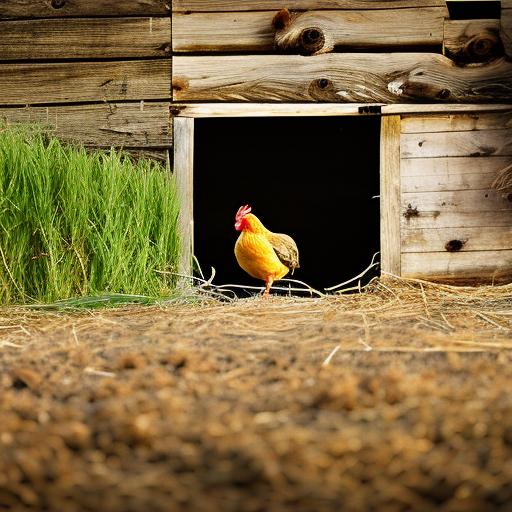Keeping chickens in a barn is a popular practice among poultry farmers and backyard chicken enthusiasts. It involves providing a sheltered and controlled environment for the chickens to live and thrive. This can be done by converting an existing barn or building a new structure specifically designed for raising chickens. Keeping chickens in a barn offers several benefits, including protection from predators and harsh weather conditions, as well as improved health and happiness for the birds.
Key Takeaways
- Keeping chickens in a barn can be a great way to raise poultry for eggs or meat.
- Benefits of keeping chickens in a barn include protection from predators and weather, as well as easier access for care and cleaning.
- Factors to consider before keeping chickens in a barn include space, zoning regulations, and potential noise and odor issues.
- Choosing the right type of barn for chickens depends on the number of birds and the climate in your area.
- Designing a suitable chicken coop within the barn involves providing enough space, nesting boxes, and perches for the birds.
- Proper ventilation and lighting are important for the health and well-being of barn chickens.
- Feeding and watering requirements for barn chickens include providing a balanced diet and clean water at all times.
- Cleaning and maintaining the barn and chicken coop is essential for preventing disease and keeping the birds healthy.
- Health and safety considerations for barn chickens include regular health checks, biosecurity measures, and protecting the birds from predators.
- Ultimately, whether keeping chickens in a barn is right for you depends on your goals, resources, and willingness to provide proper care and maintenance.
Benefits of keeping chickens in a barn
One of the main advantages of keeping chickens in a barn is the protection it provides from predators. Barns are typically more secure than outdoor coops, making it harder for predators such as foxes, raccoons, and hawks to access the chickens. This can greatly reduce the risk of predation and ensure the safety of the flock.
Another benefit of keeping chickens in a barn is protection from harsh weather conditions. Extreme temperatures, heavy rain, and strong winds can be detrimental to the health and well-being of chickens. A barn provides a sheltered environment where the temperature can be regulated, ensuring that the chickens are comfortable and protected from the elements.
Furthermore, barn-raised chickens tend to be healthier and happier compared to those raised in outdoor coops. The controlled environment of a barn allows for better disease prevention and management. Chickens kept in a clean and well-maintained barn are less likely to contract diseases or parasites. Additionally, the reduced exposure to stressors such as extreme weather and predators can contribute to improved overall health and well-being for the birds.
Factors to consider before keeping chickens in a barn
Before embarking on the venture of keeping chickens in a barn, there are several factors that need to be considered. One important consideration is zoning laws and regulations in your area. Some areas may have restrictions on keeping livestock or specific requirements for housing structures. It is essential to research and comply with these regulations to avoid any legal issues.
Another factor to consider is the space requirements for keeping chickens in a barn. Chickens need adequate space to move around, roost, and lay eggs comfortably. The size of the barn should be determined based on the number of chickens you plan to keep. It is recommended to provide at least 4 square feet of space per chicken in the barn.
Proper planning and preparation are also crucial before starting a barn-raised chicken operation. This includes designing the layout of the barn, ensuring proper ventilation and lighting, and setting up a suitable chicken coop within the barn. Taking the time to plan and prepare will help create a conducive environment for the chickens and make the management of the flock easier.
Choosing the right type of barn for chickens
When it comes to choosing a barn for raising chickens, there are several options to consider. One popular choice is a pole barn, which is a simple and cost-effective structure made of wooden poles and metal roofing. Pole barns provide ample space for chickens and can be easily customized to suit specific needs.
Another option is a hoop house, which is a greenhouse-like structure made of metal hoops covered with plastic sheeting. Hoop houses offer excellent ventilation and natural light, making them ideal for raising chickens. They are also relatively easy to construct and can be moved if needed.
Each type of barn has its pros and cons, so it is important to consider factors such as cost, durability, and ease of construction when making a decision. Consulting with experienced poultry farmers or professionals can also provide valuable insights into choosing the right type of barn for your specific needs.
Designing a suitable chicken coop within the barn
A well-designed chicken coop is essential for keeping chickens in a barn. The coop provides a safe and comfortable space for the chickens to roost, lay eggs, and seek shelter. When designing a chicken coop within the barn, there are several factors to consider.
Firstly, ensure that the coop has adequate space for the number of chickens you plan to keep. Each chicken should have enough room to move around and access the nesting boxes comfortably. It is recommended to provide at least 2 square feet of space per chicken in the coop.
Ventilation is another important aspect to consider when designing a chicken coop. Proper ventilation helps remove moisture, ammonia, and odors from the coop, creating a healthier environment for the chickens. This can be achieved by installing windows or vents that allow for air circulation without creating drafts.
Additionally, the coop should have easy access to food and water for the chickens. Consider placing feeders and waterers in convenient locations within the coop to ensure that the chickens have constant access to clean water and a balanced diet.
Understanding the importance of proper ventilation and lighting

Proper ventilation and lighting are crucial for maintaining a healthy and comfortable environment for barn-raised chickens. Good ventilation helps remove excess moisture, ammonia, and odors from the barn, reducing the risk of respiratory issues and other health problems. It also helps regulate temperature and humidity levels, ensuring that the chickens are comfortable.
To ensure adequate ventilation in a barn, consider installing windows or vents that can be opened or closed as needed. This allows for fresh air to enter the barn while controlling airflow during extreme weather conditions. It is also important to regularly clean and maintain ventilation systems to prevent blockages and ensure optimal airflow.
Proper lighting is equally important for barn-raised chickens. Chickens require a certain amount of light each day to maintain their circadian rhythm and promote healthy growth and egg production. Natural light is ideal, so consider incorporating windows or skylights into the barn design to allow for ample sunlight. If natural light is limited, artificial lighting can be used to supplement it.
Feeding and watering requirements for barn chickens
Feeding and watering requirements are essential aspects of raising chickens in a barn. Providing a balanced diet and access to clean water is crucial for the health and productivity of the flock.
Chickens should be fed a diet that consists of a combination of grains, protein, vitamins, and minerals. Commercial chicken feed is readily available and provides a balanced diet for chickens. It is important to choose a feed that is appropriate for the age and type of chickens you are raising.
In addition to commercial feed, chickens can also be supplemented with kitchen scraps, fruits, vegetables, and insects. However, it is important to avoid feeding them toxic or spoiled food that could harm their health.
Clean water is essential for chickens to stay hydrated and maintain their overall health. Ensure that chickens have access to fresh, clean water at all times. Waterers should be cleaned regularly to prevent the growth of bacteria or algae.
Cleaning and maintaining the barn and chicken coop
Regular cleaning and maintenance of the barn and chicken coop are essential for the health and well-being of barn-raised chickens. A clean and hygienic environment helps prevent the spread of diseases and parasites.
Cleaning the barn and coop involves removing manure, soiled bedding, and any debris or waste that may accumulate. This can be done using shovels, rakes, or other appropriate tools. It is important to dispose of the waste properly to prevent contamination.
Bedding material should be replaced regularly to maintain cleanliness and absorb moisture. Common bedding materials include straw, wood shavings, or sand. Choose a material that is suitable for your specific needs and readily available in your area.
Regularly inspecting the barn and coop for any signs of damage or wear is also important. Repair any broken or damaged structures promptly to ensure the safety of the chickens and prevent further damage.
Health and safety considerations for barn chickens
Ensuring the health and safety of barn-raised chickens is of utmost importance. There are several key considerations to keep in mind to prevent diseases, manage pests, and protect the flock from predators.
Disease prevention is crucial when raising chickens in a barn. This can be achieved by practicing good biosecurity measures, such as limiting access to the barn, quarantining new birds, and regularly cleaning and disinfecting the coop. It is also important to monitor the flock for any signs of illness and seek veterinary care if needed.
Pest control is another important aspect of maintaining the health and safety of barn-raised chickens. Common pests that can affect chickens include mites, lice, and rodents. Regularly inspect the barn and coop for signs of infestation and take appropriate measures to control pests, such as using insecticides or traps.
Predator control is essential to protect the flock from potential threats. Secure the barn and coop with sturdy fencing or wire mesh to prevent access by predators. Consider installing motion-activated lights or alarms to deter predators from approaching the barn.
Is keeping chickens in a barn right for you?
Keeping chickens in a barn offers several benefits, including protection from predators and harsh weather conditions, as well as improved health and happiness for the birds. However, it is important to consider factors such as zoning laws, space requirements, and proper planning before embarking on this venture.
Choosing the right type of barn and designing a suitable chicken coop within the barn are crucial for creating a conducive environment for the chickens. Proper ventilation and lighting, as well as providing adequate feeding and watering requirements, are essential for maintaining the health and well-being of barn-raised chickens.
Regular cleaning and maintenance of the barn and chicken coop are necessary to prevent the spread of diseases and ensure a hygienic environment. Additionally, implementing proper health and safety measures, such as disease prevention, pest control, and predator control, is crucial for protecting the flock.
In conclusion, keeping chickens in a barn can be a rewarding and fulfilling experience for poultry farmers and backyard chicken enthusiasts. By considering the factors discussed in this article and implementing appropriate measures, you can create a safe and comfortable environment for your barn-raised chickens.
If you’re considering keeping chickens in a barn, you may also be interested in learning about the importance of providing a suitable chicken coop and nest box. A well-designed coop not only provides a safe and comfortable space for your chickens but also encourages egg-laying and easy collection. To find out more about chicken coop and nest box ideas, check out this informative article on Poultry Wizard: https://poultrywizard.com/keeping-chickens/chicken-coop-nest-box/. It’s essential to create an environment that meets the needs of your feathered friends, and this article will guide you through the process.
FAQs
Can you keep chickens in a barn?
Yes, chickens can be kept in a barn as long as the barn is properly ventilated, has adequate lighting, and is kept clean.
What are the benefits of keeping chickens in a barn?
Keeping chickens in a barn can provide protection from predators, shelter from extreme weather conditions, and a controlled environment for egg-laying.
What are the requirements for keeping chickens in a barn?
The barn should have enough space for the chickens to move around freely, perches for roosting, nesting boxes for laying eggs, and access to food and water. The barn should also be cleaned regularly to prevent the buildup of waste and disease.
What type of ventilation is needed for a chicken barn?
A chicken barn should have proper ventilation to prevent the buildup of ammonia and other harmful gases. This can be achieved through the use of windows, vents, or fans.
What type of lighting is needed for a chicken barn?
Chickens require a certain amount of light to lay eggs. A barn should have enough natural or artificial light to provide at least 14 hours of light per day.
What are the potential health risks of keeping chickens in a barn?
If a barn is not properly ventilated or cleaned, it can lead to the buildup of harmful bacteria and disease. It is important to maintain a clean and healthy environment for the chickens to prevent the spread of illness.
Meet Walter, the feathered-friend fanatic of Florida! Nestled in the sunshine state, Walter struts through life with his feathered companions, clucking his way to happiness. With a coop that’s fancier than a five-star hotel, he’s the Don Juan of the chicken world. When he’s not teaching his hens to do the cha-cha, you’ll find him in a heated debate with his prized rooster, Sir Clucks-a-Lot. Walter’s poultry passion is no yolk; he’s the sunny-side-up guy you never knew you needed in your flock of friends!







